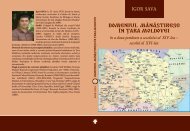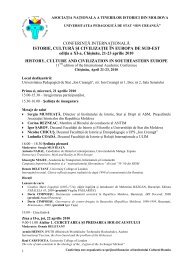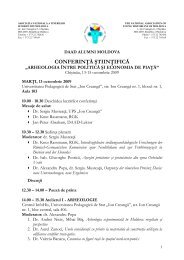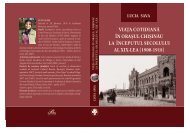Publicatie cu continut integral - Asociatia Tinerilor Istorici din Moldova
Publicatie cu continut integral - Asociatia Tinerilor Istorici din Moldova
Publicatie cu continut integral - Asociatia Tinerilor Istorici din Moldova
You also want an ePaper? Increase the reach of your titles
YUMPU automatically turns print PDFs into web optimized ePapers that Google loves.
1) the countries confirmed theirs position about the aims, proclaimed in this declaration;<br />
2) the participants highly estimated an active participation of the European Universities Association (EUA)<br />
and the European National Students Unions (ESIB);<br />
3) they noted very constructive help of the European Commission and made some remarks concerning further<br />
process (considering different aims of the Bologna declaration).<br />
At this summit there were mainted important elements of the European higher education: constant studyng<br />
during all life; the students’ motivated attraction for studying; assistance to appeal and competitiveness increase<br />
the European higher education for other regions of the world.<br />
The Bologna process third stage was held in Berlin on September, 18-19, 2003, where the appropriate Communique<br />
was signed. The newest decision of the Berlin summit was all-European requirements and standards<br />
extension on doctor’s degrees. It was mainted that in country-members of the Bologna process there can be one<br />
doctor’s degree – «the Doctor of Philosophy» in the appropriate spheres of knowledges (natural sciences, social,<br />
economics etc.). There was offered the formula of three-level education (3-5-8); accor<strong>din</strong>g to it a man must spend<br />
not less than three years for recieving a «bachelor» level, not less than 5 years – for recieving a «master’s» level,<br />
and not less than 8 years for recieving a scientific degree «the Doctor of Philosophy». It is important, that educational-qualification<br />
levels and scientific degree are considered as a part of complete education system of a human.<br />
There were payed attention to the European higher education. It was accentuate importance of the control and<br />
quality qualification order in the European standards.<br />
The known international organization «European Network Quality Assurance» (ENQA) develops and supports<br />
these standards in Europe. The additional modules, coursess and educational plans with the European contents<br />
orientation and organization was developed. There was made an accent on the important role of higher educational<br />
institutions, which should make real the educational process during all human’s life. Also there was shown that<br />
the European area of higher education and European area of research’s activity – two interconnected parts of the<br />
commonwealth of learning. It is important, that accor<strong>din</strong>g to the decisions, which was reached during realization<br />
of this process, nowaday Bologna commonwealth has 40 countries of Europe. It is clear, that taking into account<br />
deep national educational and scientific traditions it is hard to refuse many advantages of the Ukrainian system,<br />
for example two scientific degrees, and in the long term – Supreme Certification Commission of Ukraine of<br />
Ukraine as a state control institution of scientific degrees’ standards, etc.<br />
So, the Bologna process is a process of structural reforming of national systems of higher education, the educational<br />
programs changes and necessary transformations in European higher educational institutions. Its aim is<br />
creation the European scientific and educational area for the sake of increase in employment opportunities for<br />
holders of qualification, citizens’ mobility improvement at the European job-market, raise in competitiveness of<br />
the European higher school, till 2010. For achievement this aim there was offered:<br />
1) to accept convenient and clear diplomas’ and qualifications’ gradations;<br />
2) to provide two-level structure of higher education as the basis;<br />
3) to provide a scientific degree «the Doctor of Philosophy» in Europe;<br />
4) to use the uniform system of credit units (system ECTS – European Community Course Credit Transfer System);<br />
5) to provide uniform and mutually recognized the Diploma Supplement – is a do<strong>cu</strong>ment attached to a higher<br />
education qualification aiming at improving transparency and facilitating recognition. It is designed to provide a<br />
description of the nature, level, context, content and status of the studies that were successfully completed by the<br />
individual named on the original qualification to which this supplement is appended. This flexible tool was initiated<br />
by UNESCO and revised jointly by UNESCO, the European Commission and the Council of Europe;<br />
6) to create, to support and to develop the European quality standards (using comparative criteria, mechanisms<br />
and estimation methods accor<strong>din</strong>g to the requirements ENQA);<br />
7) to remove existing barriers for widening of mobility for students, teachers, researchers and a higher schools’<br />
managers.<br />
At all stages of the Bologna process there was proclaimed, that this is a free-will process; it is polysubjective;<br />
it bases on European educational and <strong>cu</strong>ltural wealth; it doesn’t grade national features of educational systems of<br />
different countries; it is multivariable, flexible, open, progressive.<br />
– 1 –
















